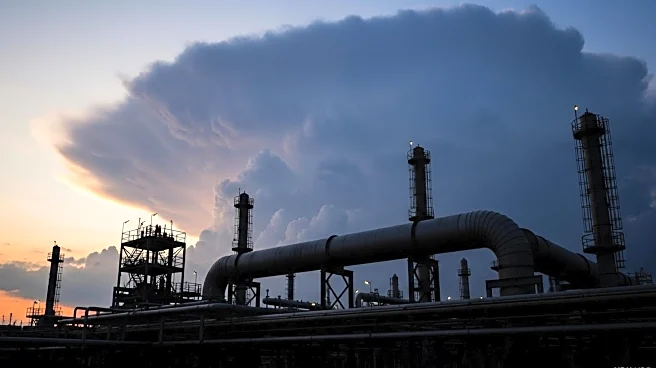What's Happening?
Exxon Mobil has announced a delay in the construction of a planned $10 billion plastics production plant on the Texas Gulf Coast. The decision comes in response to current market conditions, as stated by the company. The plant, intended to be located in rural Calhoun County, was expected to produce up to 3 million tons of polyethylene pellets annually, primarily for export to Asia. The delay follows a legal challenge led by environmental advocate Diane Wilson, which resulted in a county district court judge invalidating a local school board's tax break agreement with Exxon. The court ordered a redo of the public hearing on the tax break, citing inadequate public notice. Exxon had sought a 50% reduction in property taxes for ten years, starting in 2031, when the plant was projected to become operational.
Why It's Important?
The postponement of Exxon's project highlights the complex interplay between corporate investment decisions and local community actions. The delay underscores the influence of environmental advocacy and legal challenges on large-scale industrial projects. For Exxon, the decision reflects a cautious approach to capital investment amid uncertain market conditions, despite forecasts of strong growth in global plastics demand. The situation also illustrates the potential impact of community resistance on corporate strategies, as local opposition can lead to significant project delays or modifications. The outcome of this case could set a precedent for how similar projects are approached in the future, particularly in regions where environmental concerns are prominent.
What's Next?
Exxon has indicated that it remains interested in pursuing the project when market conditions improve. The company is maintaining relationships with community leaders and contractors to potentially resume the project in the future. The local school board is expected to hold a new public hearing regarding the tax break agreement, which could influence Exxon's decision-making process. Meanwhile, environmental groups, led by Diane Wilson, are likely to continue their advocacy efforts, potentially affecting the project's timeline and conditions. The broader plastics market is projected to grow significantly, which may eventually support the project's viability.
Beyond the Headlines
The delay of Exxon's plant raises broader questions about the sustainability and environmental impact of large-scale industrial projects. It highlights the growing power of grassroots environmental movements in shaping corporate behavior and public policy. The case also reflects a shift towards more transparent and inclusive decision-making processes in local governance, as communities demand greater accountability from both corporations and public institutions. This development could influence future industrial projects, encouraging companies to engage more proactively with local stakeholders to address environmental and social concerns.











